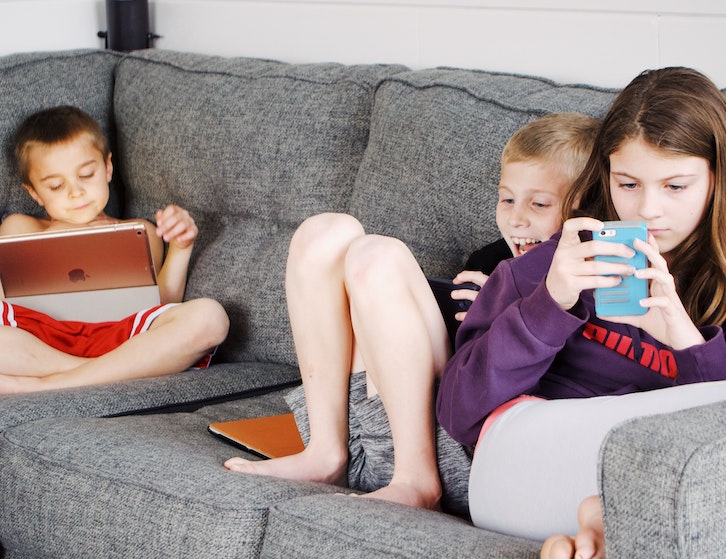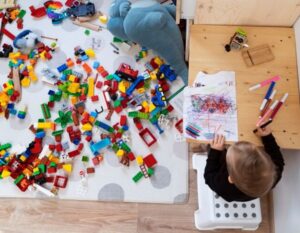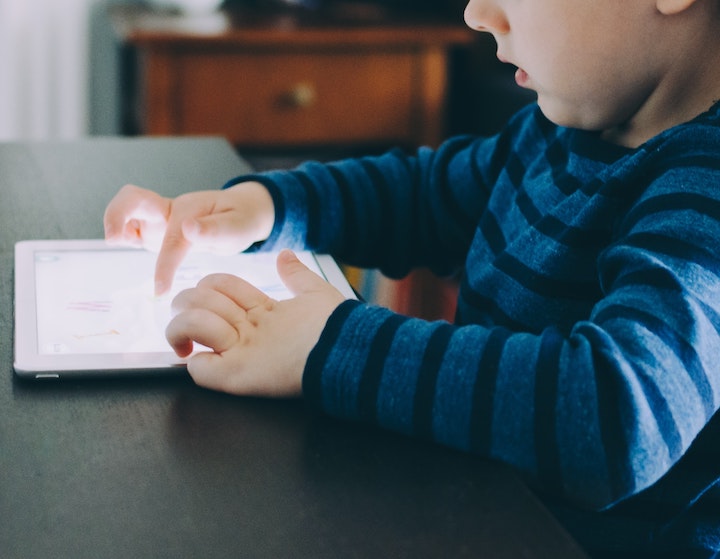
 Post Category - ParentingParenting - Post Category - Toddler & PreschoolerToddler & Preschooler - Post Category - Older KidsOlder Kids
Post Category - ParentingParenting - Post Category - Toddler & PreschoolerToddler & Preschooler - Post Category - Older KidsOlder KidsIs your kid juggling different forms of media (WhatsApp messages on phones, videos on browsers, social media)? Media multitasking is affecting our kids’ ability to think deeply, focus and even socialise! Here’s what parents can do to help.
Screens! It’s surreal to think that in just a few decades, technology has come to impact our kids’ daily lives so profoundly. Today we commonly see teens ‘hanging out’ in silence, fixated on their devices, whole families at a restaurant staring down at their screens or toddlers in prams holding their iPads. No one is ever bored when there’s technology to entertain (which is a problem in itself).
Undeniably our kids and teens are growing up in a starkly different world to the one we did. They don’t know a world without technology. For most kids, my own girls included, it seems laughable that there was a time in the past when people didn’t carry phones and weren’t contactable outside of the house. Back then technology use consisted of Nintendo after school or early morning cartoons. Now the majority of our kids carry multiple devices (cellphones, tablets, gaming consoles) with them 24-7 and are exposed to their first device in the first two years of their life.
So what do we know about the tech use of ‘digital natives’ kids?
We know:
- 95% of teens have access to a smartphone
- 45% say they are online “almost constantly”, up to 6-9 hours per day.1
- Many check their phone up to 150 times per day
- 50% often or sometimes use social media while doing homework.2
- 60% text while doing homework
Read More: I’m Letting My Kids Get Bored on Purpose! Here’s Why You Should Too
Being switched on like this constantly bombards developing brains with massive amounts of information. Researchers estimate we receive forty gigabytes of incoming information per day which is roughly the equivalent of 10-13 movies.3. To cope with this increasing load we have seen new behaviours evolve; some helpful, others not so much. One behaviour is media multitasking.
Media multitasking is using many different forms of media (e.g. social media, browser, TV, gaming) or watching media while doing other tasks (e.g. eating dinner or doing homework). Recent research shows that teens are some of the heaviest users of media multitasking and they often use up to three or more streams of media simultaneously.4 For so many of us multitasking in daily life is considered a form of productivity or even a badge of honour, but what does the science on media multitasking tell us?
Media multitasking can lower productivity by 40%

To understand its effects let’s think about what happens in our brains when we pay attention. First, when we focus on something specific e.g. what someone is saying, we engage a part of our attentional system called focussed or selective attention. When we get distracted we disengage or let go of that focus, and shift it, consciously or unconsciously, to another object e.g. our phone. When we multitask this happens over and over – we focus, disengage, shift and re-focus our attention between two or more different things.
The downside of this process is that it consumes time and energy. We know that some of our teens are switching between texts, social media and other media as often as every 6 minutes. As the American Psychological Association explains, “although switching costs may be relatively small, sometimes as little as a few tenths of a second per switch, they can add up to a large amount … and can cost as much as 40% of someone’s productive time.” Essentially it can end up taking our kids longer and requires more attention to be able to finish their work.
Media multitasking can interfere with our kids’ ability to focus
Being so accustomed to high levels of switching presents a real problem for our kids as it means they struggle to focus on one thing for longer periods; a critical skill in tasks like reading and communicating.
It is this habit that then leads to the multitasking paradox: we continue to multitask even when we know that our performance is deteriorating because of it.
Media multitasking affects our ability to think deeply
Being able to really understand and process a concept, to put it into memory and work with it requires concentration for a sustained period of time. We need to connect that piece of information with what we already know and think more deeply about it. As stated by Dr. Jim Taylor, author of Raising Generation Tech, “without the ability to pay attention to something, kids are not going to be able to process [information]. They’re not going to be able to consolidate it into memory, which means they’re not going to be able to interpret, analyse, synthesise, critique and come to some decision about the information.”
One research study with 523 pre-adolescents found that those who frequently multi-tasked showed problems in three areas of executive functioning and showed greater behavioural problems including task switching, focus and inappropriate behavioural inhibition.

Media multitasking even can affect how we socialise
In some classrooms which allow laptops or access to devices, this can pose a real issue to knowledge retention. If our kids are checking their devices while listening to the lesson it can jeopardise the learning they take away from it; placing even more strain on them at home when they need to remember what they have learned.
This also applies to social connection; in order to build solid relationships and build their communication skills, our kids need to be able to resist the urge to give into distraction and the demands of technology for the period of a conversation to engage and listen to others.
Teens are using tech as a mental break
We know that our kids (much like adults) are using tech as a mental break – to deal with anxiety or stress – but research suggests that their nervous systems are actually being stimulated by its use, not relaxed.
When our children aren’t taught how to deal with their strong feelings in a healthy way, technology can seem like a good option to ‘relax’ or ‘self-soothe’, but ultimately this can feed into the addiction cycle. Interestingly, new neuropsychological research shows when we rely on smart-phones excessively it can change the chemistry of our brains. In their study comparing smart-phone addicted teens with non-addicted teens they found a higher level of activation in the reward circuit of the brain – the nucleus accumbens and GABA ratio – for those addicted teens4. Ultimately if our children rely on tech to soothe emotions it is likely to become a habit that will be harder to break down the track.
So is there anything we can do as parents to curb the negative effects of media multitasking on our pre-teens and teens?
Yes! Despite their new need for independence, moodiness and push-back, there is still a lot we can do to guide and influence our kids’ habits and attentional skills.
Tips for parents to help our kids focus in a digital age
1. Start early with mindfulness
Mindfulness is the ability to pay attention to the here and now, with a curious, non-judgmental attitude. Studies show that mindfulness practice directly strengthens the regions of the brain responsible for attention and awareness and as such can be a powerful antidote to the negative effects of media multitasking. When their minds are distracted or split between multiple tasks, mindfulness gives our kids the motivation and skills to choose more easily where to place their attention. Starting earlier to introduce mindfulness and ongoing practice helps build stronger levels of mindfulness, which they can draw on their pre/teens when stress becomes more complex.
Here are some easy ways to engage your child with mindfulness:
– Find opportunities for them to learn and practice mindfulness meditation. e.g. organise to go to a yoga or mindfulness class, help kids learn some simple breathing exercises, do some mindful colouring, eating or go on a mindful walk in nature.
– Encourage them to engage their senses – e.g. look at the colours in that sunset! Or can you smell the cinnamon and vanilla in those cookies? Our senses are always in the present moment and are a great way to ground us in the here and now!
– Get them to notice where their mind is e.g. “I can see you’re finding it hard to concentrate, is something distracting you?”or “You look like you have something on your mind, want to chat?” In order to know we are distracted and outside of the moment we need to be self aware to notice what our mind is doing first.
– Encourage your child to read! It may be hard for books to compete with the shiny world of tech but keeping up the skill of reading for enjoyment offers an invaluable opportunity for our kids to build their attention and helps them build important skills such as perspective-taking, empathy and creativity. One study conducted by the Cincinnati Children’s hospital found that time spent reading (versus tech) had higher levels of brain connectivity in regions of the brain responsible for language, empathy and attentional control.
2. Teach your preteen positive tech habits
Help your child learn to know the difference between when media multitasking is okay and when it may be detrimental. We know that when we are trying to achieve something specific – a homework assignment or project, multitasking can work against us. But when we have some spare time and want to watch a movie while texting our friends the costs are less.
Help them keep their phone out of their study space; set tangible study goals and set their own reward for staying focused and finishing that task e.g. seeing a friend, watching a movie or shooting hoops out in the backyard to celebrate their focus.
3. Create tech-free spaces in your house
Kids are not naturally inclined to set their own limits and the development of self-control is something heavily influenced by the home environment. We know that kids thrive in a home environment that combines both love and limits. And it is no different with tech. Help your child clear their head and take a break from devices and set up tech-free zones in the house e.g. no phones at the dinner table or social media during homework.
If you face resistance? Explain the why! E.g. how it is good for your kid’s brain to have a break from tech or how they can get their homework done faster. It’s a great way to carve out positive family time and can set up positive mental health habits for your teen.
4. Model healthy tech habits
There really is nothing more powerful than your child seeing you and the rest of the family walking the talk when it comes to tech. Show them how you manage your tech; help them see you do other non-tech activities and show them all the positive uses tech can offer e.g. learning a language or planning a family vacation. And don’t forget the invaluable conversation of how you deal with the pressures of tech and the tricks you have found to help yourself keep focussed!
At the end of the day we can’t change the world in which our children are growing up – as tech is here to stay. But we can intentionally help them to cultivate the skills they need to thrive in it.






 View All
View All





 View All
View All









 View All
View All




![[𝗦𝗔𝗩𝗘 𝗧𝗛𝗜𝗦] 𝗙𝗿𝗲𝗲 𝗔𝗰𝘁𝗶𝘃𝗶𝘁𝘆 𝗙𝗼𝗿 𝗞𝗶𝗱𝘀 𝗪𝗵𝗼 𝗟𝗢𝗩𝗘 𝗙𝗶𝗿𝗲𝘁𝗿𝘂𝗰𝗸𝘀! 🚒🔥
Skip the usual mall stroll and check out the Civil Defence Heritage Gallery! It’s free, air-conditioned, and housed in Singapore’s very first fire station, just across from Funan Mall.
Spanning two full floors, the gallery dives into Singapore’s firefighting history, major rescue missions, and the evolution of the SCDF. There are interactive exhibits, immersive displays, and even emergency preparedness tips for the public.
Bonus: Selected fire stations also host Saturday morning open houses with guided tours where you can watch fire gear demos, meet firefighters, and see those high-pressure water sprays in action!
𝗛𝗼𝘄 𝗺𝘂𝗰𝗵? FREE
𝗪𝗵𝗲𝗿𝗲? 62 Hill St, Singapore 179367
𝗢𝗽𝗲𝗻𝗶𝗻𝗴 𝗵𝗼𝘂𝗿𝘀? 10 am–5 pm (Closed on Mondays)
Comment “Fire” or link in bio for more details!
Tag your parent crew and plan your next adventure with the little ones! 👨👩👧👦💥
.
.
.
.
.
.
.
#SGFireStation #SCDFGallery #ThingsToDoWithKidsSG #FreeFamilyFun #SGParents #KidFriendlySG #FiretruckLovers #MuseumAdventure #SCDF #HeritageGallery #SGMums #FamilyWeekendSG #LearningThroughPlay #SingaporeWithKids](https://www.sassymamasg.com/wp-content/plugins/instagram-feed/img/placeholder.png)
